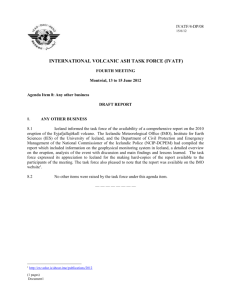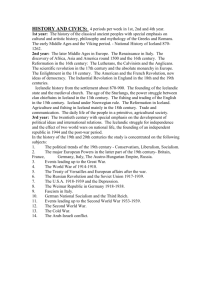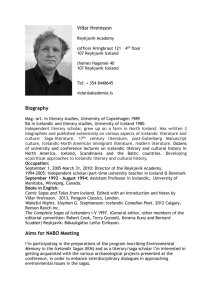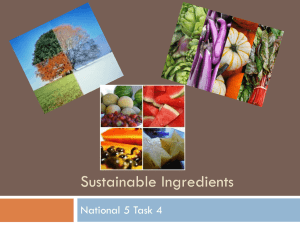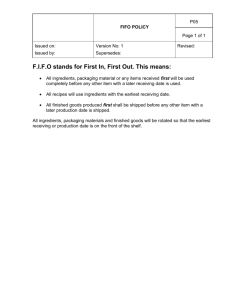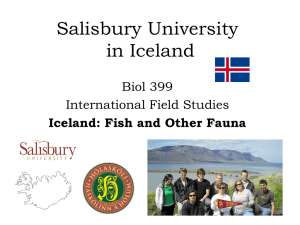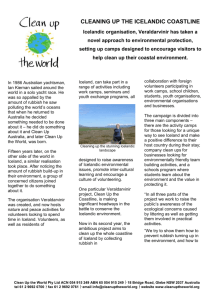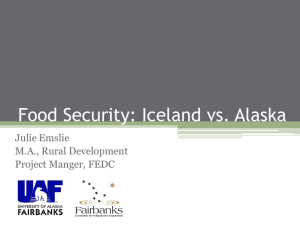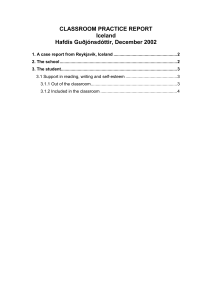Icelandic wrestling
advertisement
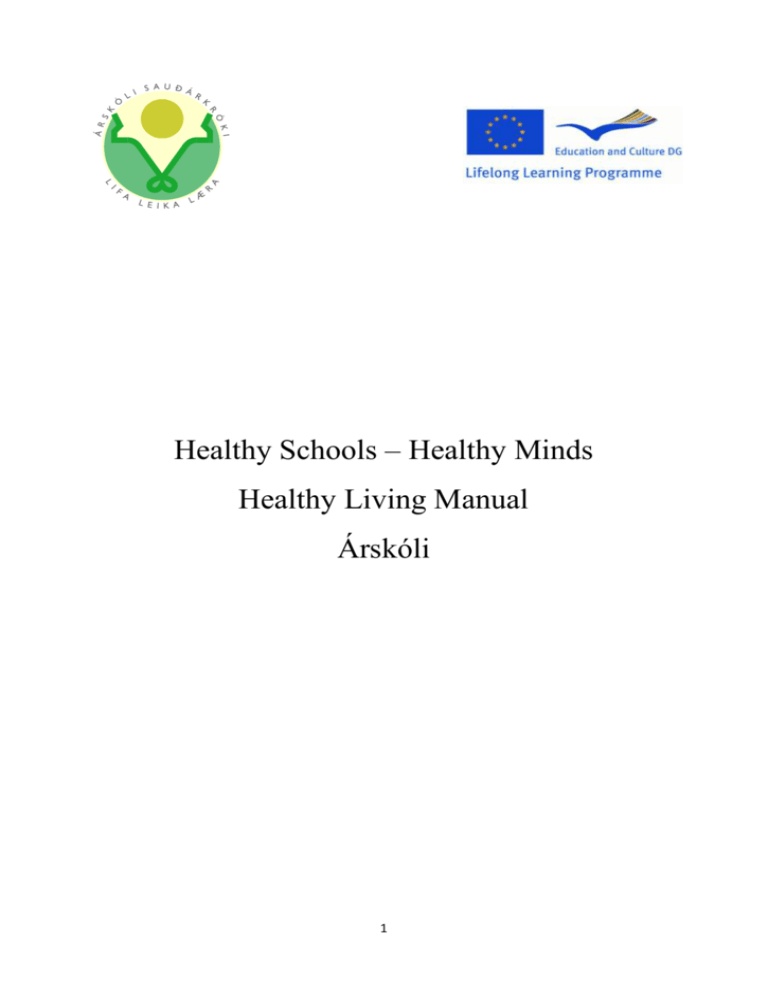
Healthy Schools – Healthy Minds Healthy Living Manual Árskóli 1 Contents Introduction ........................................................................................................... 3 Our lifestyle ......................................................................................................... 12 Our Comenius work ............................................................................................ 13 Healthrecipies ...................................................................................................... 15 Icelandic wrestling .............................................................................................. 19 2 Introduction Our school, Árskóli, is in an area named Skagafjörður (fjörður = fjord) in the north of Iceland. The number of pupils in Árskóli is around from 6 to 16 years old, 40 teachers and 35 other staff. Árskóli in Freyjugata Árskóli in Skagfirðingabraut 3 Skagafjörður, which is sometimes referred to as the Mecca of horsemanship in Iceland, is a wide valley surrounded by high mountains, reaching almost as far south as the glacier Hofsjökull. When overlooking Skagafjörður from Vatnsskarð it welcomes its visitors displaying its beauty. To the south the glacial rivers Austari- Jökulsá and Vestari-Jökulsá have carved down magnificent gorges. To the east, the mountain range proudly exposes its tallest part Grasárdalshnjúkur (1268 m). The view to southeast from Vatnsskarð The islands Málmey and Drangey are found just off the coast. The main towns and villages in Skagafjörður are Varmahlíð, Sauðárkrókur and Hofsós. View to north overlooking Sauðárkókur with the mountain Tindastóll and Drangey 4 Drangey Skagafjörður has great historical significance. Parts of The Sturlungasaga took place in Skagafjörður, events that ultimately led to the dissolution of the Commonwealth in 1264. The manor farm of the Ásbirningar family was at Víðimyri, where one of the most beautiful churches in Iceland dating back to 1834 exists. Painting from The Sturlunga saga era 5 On the eastern side of Skagafjörður are some of the main historic sites of The Sturlunga saga. Hólar in Hjaltadalur, a Bishopric in 1106 -1798, is not to be missed. Now there is a University at Hólar. Hólar in Hjaltadalur The area is rich of folk tales, such as stories of elfs, the hidden people, ghosts and outlaws. Icelands most famous outlaw, Grettir Ásmundarson, spent his last years in Drangey and was killed there in 1031. Grettislaug, a warm spring named after Grettir the outlaw 6 The Glaumbær Museum is housed in a turf farmhouse dating from 1750-1879. In the northeast part of the Hegranes peninsula there is the ancient assembly for the North of Iceland. Glaumbær The population of Skagajörður is around 4400. Of its inhibitants, 2600 live in Sauðárkrókur which is the largest urban area in Skagafjörður. There you can find our school, Árskóli, a hospital and a health centre and moreover a highschool which serves the North Western part of Iceland. All the houses in Sauðárkrókur are heated with geothermal hot water and the same goes for some other parts of Skagafjörður. Skagafjörður is a well known agricultural area where the farmers breed sheep, cows and of course horses. 7 Autumn sunrise in Skagafjörður There are many kinds of industry to be found in Sauðárkrókur, for example an insulation manufacturing factory (Steinullarverksmiðjan), Atlantic Leather specialises in the production of high-quality fishleather, a blossoming fishing industry, a creamery which specializes in making cheese, a shrimp factory, a slaughterhouse with meat processing, and in addition many small industrial businesses. Furthermore the town has an airport and an important service role for the surrounding countryside. The cultural life of Sauðarkrókur is of high quality, for example a good drama society, a music school and the regional archives of Skagafjörður - one of the best archives in the country. Krókurinn, as Sauðárkrókur is called in day-to-day conversation, is known as a sports town and there is a splendid new sports house, a horse riding hall, a swimming pool and skiing slopes in Tindastóll with 1150 metres long ski lift in 15 km distance from town. In Krókurinn you will find football fields, a golf course, a hotel, guesthouses and all general services such as a post office, banks, shops and restaurants. 8 9 The swimming pool The Center for Natural Research, Northwest Iceland was established in the year 2000 and is located in the town of Sauðárkrókur. The building is located just opposite the town church. Tourists are most welcome to visit it to see the stuffed polar bear and hear its remarkable story. It was one of two polar bears (male and female) that drifted with sea ice to Iceland from Greenland in the summer of 2008. They bears caused quite an uproar in our small community and a media frenzy in the whole country. The decision to shoot the bears was heavily debated and the Icelandic authorities received harsh criticism from abroad, especially from environmental organizations. The male bear is kept on display here at the research center, but the female bear is kept at the Sea Ice Exhibition centre in the town of Blönduós. 10 In Hofsós, which is a small village in northeast of the area, is a museeum that tells the story of the almost 20.000 Icelanders who travelled from Iceland to North-America in 1870 – 1914 and settled there. Those times were very difficult in Iceland, unusually cold weather, volcanic eruptions and great poverty. The people who left were 20-25% of Iceland´s poulation at the time. Hofsós The surroundings of Sauðárkrókur offer a lot of possibilities when it comes to outdoor activities. You can go swimming and many youngsters go horseriding. In the winter you can go skiing and during spring and summer you can go fishing in the sea, play golf and football or you can go birdwatching. From middle of July to September you can also go and pick wild berries in less than one minute walk from the nearest houses. There are plenty of options if you want to go hiking too. To name a few you can walk by the sea on a long sandbeach or you can walk by a little river in Litli-Skógur, an outdoor area. You can also walk to the top of the mountains Tindastóll (989 m) and Molduxi (706 m) and enjoy the beautiful view. And every time you come to a stream you can drink from it, the water is clean, cold and refreshing. Mountain Tindastóll in the background The water is sooooo good! 11 Our lifestyle Teenagers in Skagafjörður have various opportunities when it comes to leisure activities. Sometimes you have to pay for it but lot of it is free. Like most teenagers all over the world they love to get together and do something fun with their friends to cheer up. They often meet at each others homes or in the leisure center (Hús frítímans). Most of the time they do a lot of chatting, listen to music, play cards- and computer games and stuff like that. In the leisure center they can play ping-pong, watch TV, f.ex. interesting football games from The English Premierleague or their favorite TV show. Many teenagers spend a lot of time on the internet on programs like facebook.com. For those who want to have a quiet moment they can go to the library which contains at least 500 books or more. It is also popular to go to a pizza restaurant and share a pizza or go to the bakery to have a cake and a chat. If you are lazy and want to have it cosy at home you can rent a movie in one of the kiosks. In Sauðárkrókur teenagers have opportunities to practise organised sports. They practise f.ex. basketball, athletics, swimming, skiing, indoor football and horse riding in the wintertime. During summer many kids practise f.ex. football, golf, athletics, swimming, horse riding and motocross. It is also on offer to take part in organised courses like sailing or being a member of a club like the scouts and youth rescue team. The rescue team has f.ex. opportunities for wall climbing. Many teenagers study at the music school during the winter. For those who are not interested in organised sports and clubs there are lot of things to do. You can go walking, biking or hiking in the neighbourhood of Sauðárkrókur depending if you want to go to the mountains or to the beach, it is all in walking distance from home. Litli-Skógur is an outdoor area just above the town where people have oppurtunities to play, walk or have a picnic when the weather is good! During the summer lot of the inhabitants go to the beach or the harbour to chatch a trout for dinner and in the autumn the can go to the hills above town to pick wild berries. More costly activtities are also on offer things like river-rafting, paintball, journey to Drangey and renting a horse for a daytrip. As you can see there are lot of healthy activities to take part in in our area. 12 Our Comenius work In Árskóli we use the last week in November each year working on a special theme. This year we dedicated this week to our Comenius project. All the pupils and teachers took part and among the things we did was yoga, various kinds of outdoor activities such as games and going for a walk. The older pupils did some wall-climbing in the house of the local rescue team which was very popular. We also made and tried out some health-recipies and brought in some experts to give lectures on mental and physical health. But the most popular activity was the Icelandic Glíma (Wrestling). Most of the pupils knew of it but had never actually tried it themselves. It proved to be a great success, although one pupil broke his hand when he fell awkardly. The final day we went in our annual „peace-walk“ as usual. Then all the pupils, teachers and other staff form a chain by holding hands from the church to a lighted cross on top of a hill above town. In March the 14 and 15 years old kept a diary for one week were they wrote down what they did all day, what they ate and how many hours they slept. Then we discussed what each and everyone could do to better their lifestyles. Finally, many pupils helped making this manual. Because of your visit next September we decided to put some information about Skagafjörður and Sauðárkrókur in the manual to give you some idea of what to expect. Here are some pictures from our Comenius week. Glíma (Wrestling) Wall-climbing 13 Fun in the snow Walking on ice Making healthy food The Peace-walk 14 Healthrecipies These are our health recipies from the Comenius-week: Christmas assorted chocolates Ingredients: 1 dl dates 1 dl raisins 1 dl figs 1dl dried apricots ¼ dl chopped dark chocolate Decorated with coconut flour Method: 1. Cut the fruits in small pices and soak in water for 10 min. 2. Strain the fruits and make small balls from the ingredients 3. Roll the balls in the coconut flour. Refreshing melona´s drink Ingredients: Meat from ½ water melona (matured), seeds removed 100 ml pure ananasjuice 4 icecubes Method: Chrush the icecubes and put in food mixer with the melona and ananasjuice. Serve immediately. 15 Assorted chocolates Ingredients: 1 banana, matured-aged 1 dl oat meal 1 dl coconut flour ¼ dl Carob powder (or good cocoa) 25g dates 25g figs 1tsp vanilla powder 50g chopped dark chocolate 1 tsp chinnamon Coconot flour or grounded almonds to cover the chocolate Method: 1. Put all the ingredients in a foodmixer. 2. Refrigerate the mix. 3. Make small balls and roll it in the coconut flour. 4. It is best to store the chocolate in a freezer or wrapped in plastic for 1-2 weeks. Cheese-stikcs Ingredients: Diced cheese Vegetables and fruits Toothsticks Fasten the diced cheese and the fruits/vegetables together with toothsticks. 16 Popcorn with cheese, salt and pepper Ingredients: 1 bowl of popcorn 2 tbls butter 1 tbls olive oil ½ tsp Maldon salt Freshly grounded pepper ½ cup grated parmesan cheese Method: 1. Put butter, olive oil, salt and pepper in a small bowl and heat in microwave oven for 10 sec. 2. Put the popcorn in ovenproof mould and pour the butter mix, 3. Spread the parmesan over the popcorn 4. Bake in a 175°C warm oven for 15 min. and stir the mix twice while baking. And three more recipies from pupil´s homes: Fresh and atempted berryboozt Ingredients: 1 small bowl of Bláberjaskyr.is ½ banana Strawberries Method: Put all the ingredients in a foodmixer and serve immediately. It is nice to put icecubes in the boozt, it makes it colder and fresher. 17 Traditional Icelandic meat-soup Ingredients: 1 kg of lamb with bones 1,8 dl water 1 onion (average size) 1 tbls salt 500 g yellow tumip 500 g carrots 2 tbls rice 2 tbls dried soupherbs Method: It is best to use the front of the lamb. The meat is washed and put in a pot with cold water and one tbls of salt. Put the pot on the kitchenstove and wait until the water starts boiling. Lower the heat and skim the foam off. Cook the meat for apr. 50 min. Peel yellow tumip, carrots and onion both dices and slices. Add the vegetables and rice in the pot when the meat is half cooked. If wanted it is possible to use fresh cabbage instead of dried soupherbs. The meat can be served in the soup or separatly depending on taste. Skyrdrink Ingredients: Berries, f.ex. bluberries or strawberries (frosen) 1 pear, peeled and diced Vanilla-skyr Method: Defrost the berries to soften them a little. Mix everthing together in a foodblender. If you want the drink to be more runny it is ok. to put milk into the drink as well as if you want an extra flavor you can put another kind of fruits in it – just try something out. Some people also like to put Weetabix in it. 18 Icelandic wrestling Glima is the Icelandic national style of amateur Folkwrestling. Glima translates literally as "The Game of Joy", and is an art roughly 1100 years old. It was brought to Iceland by Viking settlers, and has been practiced as a folk art and sport ever since. The winning condition in this type of Glima is to make the opponent touch the ground with an area of the body between the elbow and the knee. The game was further formalized when the Icelandic Sports Federation published official rules for competition in 1916. Each Glima takes two minutes at most and the size of the wrestling area is 8-10 squaremetres. In the modern day, Formal Glima is characterized by 4 key points and 8 basic tricks , using the legs, hips, and feet to throw with. Each of the two wrestlers wears a special belt around the waist and separate, additional belts on the lower thighs of each leg, which connect to the main belt with vertical straps. A fixed grip is then taken with one hand in the belt and the other in the trousers at thigh height. From this position the glima-wrestler attempts to trip and throw his opponent. There are four points that differentiate it from other forms of wrestling: The opponents must always stand erect. The opponents step clockwise around each other (looks similar to a waltz) It is not permitted to fall down on your opponent or to push him down in a forceful manner, as it is not considered sportsman-like. The opponents are supposed to look across each other's shoulders as much as possible because it is considered proper to wrestle by touch and feel rather than sight. Eight Basic Tricks, each of course has variations: 1. 2. 3. 4. 5. 6. 7. 8. The Outside Stroke The inside-click, the cross-click & back-heel The twist over the knee, the outside hipe The hook The cross buttock The inside-hipe The cross-buttock aloft The full or half buttock 19
